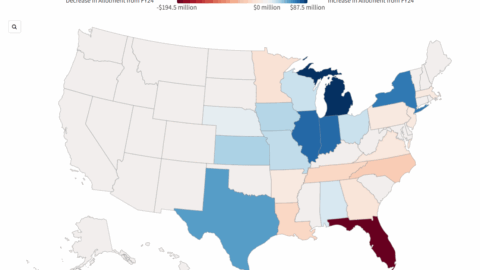A mission corrupted: Your tax dollars pay for ACC to coach big industry on how to undercut EPA’s IRIS program
Richard Denison, Ph.D., is a Senior Scientist.
On February 22, the Advocacy Office of the Small Business Administration, an agency of the Federal Government, held a meeting without any public notice and from which the press was barred. And while the office’s mission is supposed to be to provide “an independent voice for small business within the federal government,” many if not most of the attendees were from large companies and the trade associations and Washington lobbyists that represent their interests.
This meeting was the latest in a long and continuing series of so-called “environmental roundtables” that serve as a basis for the SBA’s Advocacy Office to weigh in against environmental or workplace regulations that big business opposes.
There are no records from these meetings that are made publicly available. Agendas and attendee lists are not disclosed, though I was able to obtain an agenda for this particular meeting at the last minute. I noted with interest that the first half of the meeting focused on the US Environmental Protection Agency’s (EPA) Integrated Risk Information System (IRIS) program, which provides health assessments of chemicals used by public health and environmental officials around the world.
The key draw in this meeting: a senior official from the American Chemistry Council (ACC), whose dominant members are huge global chemical companies like ExxonMobil, BASF, Dow and DuPont – in short, Big Chem. The ACC official spent a full hour coaching representatives of Big Chem and other global mining companies and automobile corporations like GM in how to pick apart and challenge recent documents developed by the IRIS program. IRIS has become a focal point of the chemical industry’s multi-front attack on independent government science. Here is the deck of Powerpoint slides used by the ACC representative and the other industry speaker.
Your tax dollars at work
Two recent reports – one by the Center for Effective Government and the other by the Center for Progressive Reform – profile the SBA’s Advocacy Office, documenting in detail how it serves as a strong anti-regulatory voice within the Federal Government – one that closely mirrors that of the chemical industry often in direct opposition to the missions and actions of other federal agencies charged with public health, worker or environmental protection
In this latest platform that SBA provided to ACC, courtesy of your tax dollars, there was not even a pretense at balance, let alone any effort to represent the voice of small business. The only two speakers were from Big Chem: the ACC official and another vocal IRIS critic who is a consultant to the chemical and petroleum industries and formerly worked for the American Petroleum Institute (API) and before that for ACC (before it scrubbed the word “chemical” from its name and was called the Chemical Manufacturers Association).
No representative of the IRIS program was invited to the meeting, nor anyone from the health or environmental communities that could have offered an alternative view of the value of IRIS.
Hardly the first time
Two other points are worth making here: First, this is far from the first time that the Advocacy Office has tangled with the IRIS program and related programs of other federal agencies. As documented in the reports cited above, despite having no scientific expertise, the office has filed extensive critical comments on the IRIS assessment of the known human carcinogen hexavalent chromium, as well as on the National Toxicology Program’s listings of formaldehyde and styrene as known and anticipated human carcinogens, respectively, in its 12th Report on Carcinogens – another focal point of attack by ACC on government science. See these earlier blog posts for details. By now it should come as no surprise that these comments largely parrot the talking points of the chemical industry.
Second, the ACC speaker at this meeting is no stranger to these issues. Just a year ago, she moved to ACC from her previous position in another federal office – the Office of Information and Regulatory Affairs (OIRA) within the White House Office of Management and Budget – where for many years she oversaw that office’s efforts to question the science behind chemical assessments conducted by EPA and other federal agencies.
Talk about a revolving door! The move – quite a coup by ACC, I must say – raises disturbing questions, given that she wasted no time in turning to her new job of lobbying on behalf of the chemical industry on the very issues she worked on while at OIRA. And to bring this ironic story full circle, now in her new private-sector capacity, she’s been given a prominent platform by another federal agency critical of chemical regulation to lobby on her new employer ACC’s behalf – still on your dime.
Why, given its stated mission, is SBA’s Advocacy Office so intent on providing its constituency with only one extreme side of the story, even going as far as to exclude the perspective of the very government program that its invited speakers are targeting? Or is this really all about something entirely different – a thinly veiled effort to let itself be used as a platform for Big Business’ anti-regulatory agenda in the guise of representing small business?












